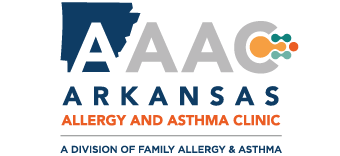Allergy Testing
What allergy testing options are available in Arkansas?
Arkansas Allergy & Asthma Clinics offer a variety of testing for patients to diagnose their allergies. Allergy Skin Testing is the primary form of testing that patients undergo to diagnose environmental allergies. Physicians may also order a blood test, oral food challenges, or special allergy testing for venom and medication allergies.
What Is an allergy skin test and how does it work?
Skin testing is the most reliable form of allergy testing. Because mast cells are located in high numbers just under the skin, results of skin testing have proven to be more accurate than blood testing in diagnosing allergies. Skin testing is a simple series of tiny scratches made on your back. Our nurses will use a small instrument similar to a plastic toothpick containing trace amounts of a single allergen, such as mold, pollen, dust mite, and pet dander, to perform the allergy test.
What to expect during your allergy skin testing appointment
Your initial appointment will be 2-3 hours long. We recommend bringing a complete list of all medications, as well as your pharmacy number and street address. This will allow our staff to send any prescriptions to your preferred pharmacy.
During the testing process, to prepare your back and arms for testing, we will use a marking pen, which may cause staining on a shirt. For this reason, you may want to bring an older shirt with you to wear home. After your back is marked, our nurses will scratch your back with different allergens.
Patients then wait 20 minutes with the allergens on their back to see if a reaction occurs. A reaction is generally a small bump, similar to a mosquito bite, and may cause some itchiness. A bump or reaction indicates that you are allergic to that specific trigger. Following the scratch test on the back, some patients may also receive intradermal testing, where a small amount of the allergen is injected under the skin of the arm to see if it causes a reaction.
Here is a video explaining the testing and immunotherapy process we show to patients while they are tested:
What medications should be stopped before testing?
If you are already taking over-the-counter or prescription allergy medication, you will be asked to stop taking these before testing to not interfere with the reactions. You should stop taking certain medications that contain antihistamines anywhere from three (3) to five (5) days before testing. Click here for a detailed list.
Understanding your Allergy Test results
Our doctors also take a medical history in addition to the allergy test to determine what allergens are bothersome and diagnose an allergy. Patients will leave their initial visit knowing what allergens they have tested positive to. Based on the test results of your allergy skin test, our allergists will recommend the best treatment options for your allergies and their symptoms.
Is allergy testing safe for infants and children?
Per the American Academy of Pediatrics, age is not a barrier to skin testing. Even infants can benefit. As the child’s immune system develops, the child should be retested to identify changes in his/her immune response. Many times foods can be reintroduced into the diet that once caused an allergic reaction. In addition to Allergy & Immunology, our allergists train in either pediatrics or internal medicine, so we are very comfortable treating pediatric patients for allergies and asthma.
Don’t keep suffering from allergies. Schedule an appointment today with one of our board-certified allergists.
